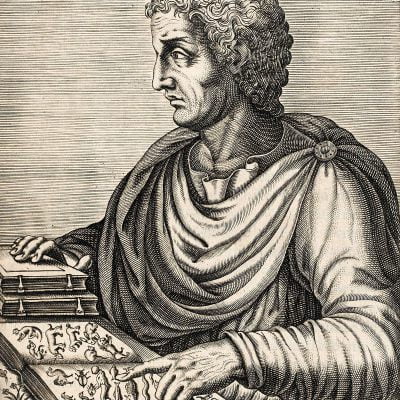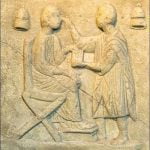Pliny the Elder (Caius Plinius Secundus) lived from 23 to 79 CE. He was a Roman writer and scholar. His only surviving work is “Natural History”, a kind of encyclopedia, which is a mine of knowledge and ideas in Roman times.
- “Physician being the only person that can kill another with sovereign impunity”
- latin: [Medicoque tantum hominem occidisse inpunitas summa est]
- description: Pliny severly refers here to the fact that Roman law did not forbid doctors to “experiment” and apply their innovative treatments to patients.
- source: Pliny the Elder, Natural history, XXIX.18
- “The one race of outstanding eminence in virtue among all the races in the whole world is undoubtedly the Roman”
- latin: [Gentium in toto orbe praestantissima una omnium virtute haud dubie Romana extitit]
- source: Pliny the Elder, Natural history, VII.41
- “Not a single day without a line”
- latin: [Nulla dies sine linea]
- description: words spoken by the Greek painter Apelles.
- source: Pliny the Elder, Natural history, XXXV, 84
- “There is nothing certain, and that there is nothing more proud or more wretched than man”
- latin: [Quasi quidquam infelicius sit homine cui sua figmenta dominantur]
- source: Pliny the Elder, Natural history II, 7
- “[…] how happy, how truly delightful even would life be, if we were to desire nothing but what is to be found upon the face of the earth; in a word, nothing but what is provided ready to our hands!”
- latin: [(…) quam beata, immo vero etiam delicata esset vita, si nihil aliunde quam supra terras concupisceret, breviterque, nisi quod secum est!]
- source: Pliny the Elder, Natural history XXXIII, 1
- “Meaningless thunderbol”
- latin: [Brutum fulmen]
- description: later used as “empty threat”.
- source: Pliny the Elder, Natural history II.43
- “In a nutshell”
- latin: [In nuce]
- description: a reference to the words of Cicero, who claimed that on a small piece of parchment the text of Homer’s “Iliad” could fit in a nut shell.
- source: Pliny the Elder, Natural history VII.21
- “Only a doctor can kill a man with impunity”
- latin: [Medicoque tantum hominem occidisse inpunitas summa est]
- source: Pliny the Elder, Natural history XXIX.8
- “Out of Africa, always something new”
- latin: [Ex Africa semper aliquid novi]
- description: Greek saying used in antiquity, known in the “What’s new in Africa?” version. It emphasized the uniqueness of this area.
- source: Pliny the Elder, Natural history II, 8, 42
- “I died from having too many doctors”
- latin: [Turba se medicorum perisse]
- description: a tombstone inscription of an “unfortunate” patient. Pliny emphasizes that in his time doctors often differed as to the method of treatment, which was the main loss for the patient.
- source: Pliny the Elder, Natural history XXIX, 5
- “With a grain of salt”
- latin: [Cum grano salis]
- description: with the addition of skepticism.
- source: Pliny the Elder, Natural history XXIII, 8, 149







